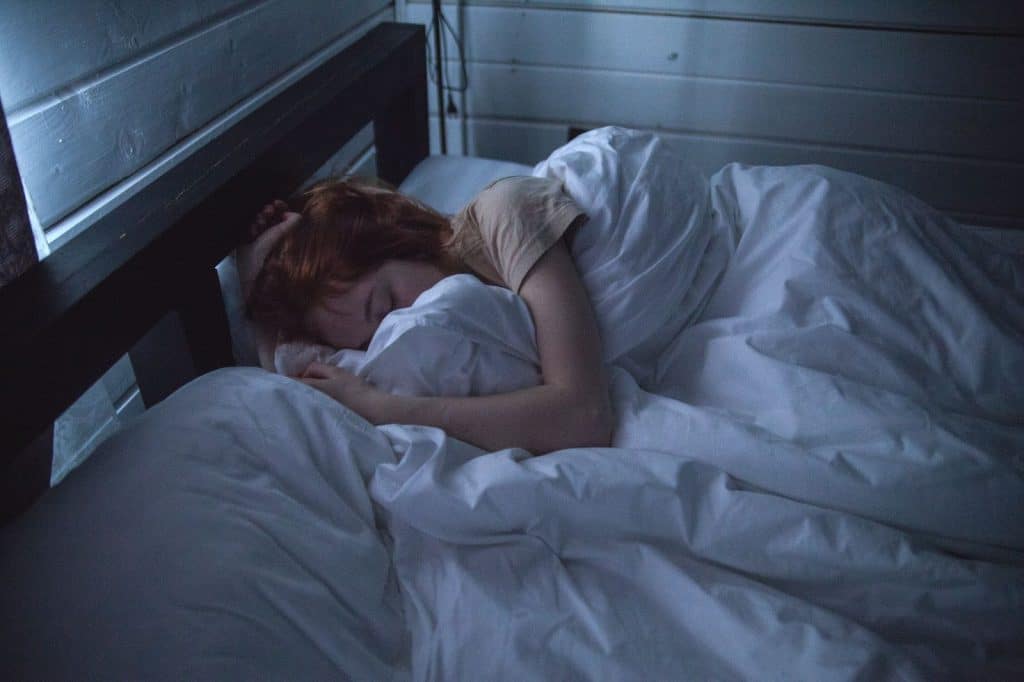Heavy sleepers often manage to get a good night’s sleep but may struggle to wake up when needed. On the other hand, light sleepers are easily woken up by the slightest noise and may require a perfectly quiet sleep environment to sleep better.
The best way to sleep better and wake up easier is by practicing healthy sleep habits and getting enough sleep. When your body is well rested, you’ll be well prepared and in a better mood to wake up.
In this article, we’ll go over the different stages of sleep and explain how light sleep and deep sleep fit into each sleep cycle. We’ll then provide tips on sleeping lighter without significantly compromising your sleep quality.
You may also be interested in our post on how to stop sleeping through alarms.
How Do Light and Deep Sleep Work?
During sleep, various essential processes occur inside the human body, and they are crucial in maintaining the regular functioning of our vital systems.
Whether you’re a light or heavy sleeper, you’ll want to keep in mind how your sleep cycle is structured, particularly if you want to alter it for any reason.

What are the Stages of Sleep?
Understanding sleep stages help figure out ways to get a good night’s sleep. Each sleep cycle is composed of 4 main stages: 3 NREM sleep stages and 1 REM sleep stage.
Here’s how they’re broken down.
NREM Sleep
Non-Rapid Eye Movement sleep is the part where bodily processes gradually slow down as you enter a deep sleep state. It comprises the following 3 main stages:
- Stage N1
Transitioning from awake to asleep is naturally the first and lightest sleep stage. Your brain and senses are still somewhat active, and you can easily be woken up by surrounding noise.
Your breathing slows down, and your eyes move significantly less. Typically, Stage N1 lasts 5 to 10 minutes before the deeper sleep begins.
- Stage N2
The second NREM stage marks the transition into a deeper sleep. Your body temperature drops, and your heart rate slows down further. The brain begins to produce high-frequency sleep spindles.
These spontaneous brain rhythms, or sleep spindles, are essential in consolidating memory as your body prepares to enter the deep stages of sleep.
- Stage N3
Stage N3 is also known as deep sleep or slow-wave sleep. As the names imply, this and the REM stage are sleep’s deepest and most restorative stages.
During N3, the brain produces low-frequency waves, causing you to be less responsive to your surroundings. Naturally, it’s not easy to wake up during this stage.
REM Sleep
REM (Rapid Eye Movement) is the stage where brain activity, eye movement, breathing, and heart rate increase significantly. This is where vivid dreams fit in, for instance.
The REM stage is a vital part of the sleeping cycle and helps regulate memory and emotion, among other things.
What Happens During Light Sleep
The first NREM stage is considered light sleep. Heart rate and breathing slow, and muscles relax, although you’ll still be aware of your surroundings. You can easily wake up during light sleep. Light sleep constitutes 40% to 50% of our sleep and increases with age.
What Happens During Deep Sleep
Stages N3 and REM are regarded as the deep sleep stages.
During N3, body temperature drops, and muscles relax fully. Your heart rate and breathing slow down, and your brain activity is at its lowest. It is then followed by the REM stage, characterized by a significant increase in heart rate, brain activity, and eye movement.
This is where dreams mostly occur.

How to Sleep Lighter?
Heavy sleepers fall asleep more easily than they wake up. However, it doesn’t have to be a trade-off. Here are a few things that can help you sleep lighter and wake up easier.
Get Enough Sleep
The best way to wake up in the best shape is to have enough sleep.
A lack of sleep will make you overly tired and need more sleep. Knowing when you need to wake up and go to bed early will help you sleep much better. You’ll wake up much easier when you’re well rested.
Take Short Naps
A good night’s sleep is undoubtedly crucial to your well-being if you’re a heavy sleeper. One way of sleeping lighter at night is to reduce the amount of night sleep your body typically requires.
You can do this by taking a short nap or two during the day. Brief naps are very refreshing and can improve your sleep quality at night, and you’re also likely to wake up easier even if you sleep less than usual.
If you usually get tired during the day and are a heavy sleeper, naps will make you sleep less heavily at night.
The only thing to watch out for is how long your naps take. The ideal time is 15 to 20 minutes, guaranteeing you don’t get into a deep sleep. Long naps can hinder your ability to sleep at night and disrupt your sleep schedule.
Let There Be Morning Light
There’s nothing more refreshing and energizing than natural light creeping inside your bedroom in the morning.
Exposure to daylight will make you wake up much easier and be more alert. It also favors a healthy sleep-wake cycle in the long run.
If your sleep schedule involves waking up at night, you can opt for a wake-up light, which is typically an alarm clock feature. While these aren’t as effective as natural daylight, they can help prepare your body to wake up.
It is also a much better alternative to leaving a light on throughout the night, which can lead to a disrupted sleep that’s hard to wake up from.
Sleep With Something Playing in the Background
Another way to alter your sleep environment is to play something in the background before falling asleep. Music, for instance, will improve your sleep quality and help you feel less groggy when you wake up.
Loud noises aren’t recommended since you might wake up earlier than you want. You might also be unable to hear your alarm clock, which needs to be louder than whatever it is you’re playing.
Speaking of alarm clocks, your choice of music can also affect how you wake up. Set an energizing piece of music that you like to help you wake up easier and in a better mood.
Tips on How to Fall Asleep When You’re A Light Sleeper
If you’re planning to become more of a light sleeper, you shouldn’t compromise your sleep quality significantly. After all, deep sleep stages are why light sleepers often don’t manage to get a good night’s sleep.
Here is some advice on how to fall asleep fast and sleep better.

Maintain A Regular Sleep Schedule
Whether you’re a light or heavy sleeper, establishing a regular sleep schedule will significantly improve your sleep quality, besides the ability to fall asleep faster.
Sleep irregularity is one of the leading causes of several sleep disorders and will drain your physical and mental energy over time.
Avoid Using Electronics Before Bed
Too much exposure to screens right before bed leads to disturbed sleep. While you may wake up easier from a night of restless sleep, you’re more likely to feel exhausted. It’s advised to avoid screens for around an hour before falling asleep.
Have A Consistent Bedtime Routine
Establishing a good bedtime routine ensures a better night’s sleep.
By practicing healthy sleep habits, you’ll manage to fall asleep relaxed and carefree. Whether you’re a light sleeper or want to sleep lighter, this improves your sleep quality and makes it easier to fall asleep and wake up.
Limit Caffeine and Alcohol Use
Drinking coffee or alcohol in later hours of the day will disrupt your sleep cycle and make it harder to fall asleep and get a good night’s rest. Also, waking up from a disturbed sleep can be even more difficult than a deep sleep stage.
Sleep Early
Being a light sleeper comes with several issues, such as poor quality sleep and fatigue during the day.
An excellent way to deal with this is to sleep early enough. This way, you will allow yourself more time to fall asleep and will manage to get a good night’s sleep. This, in turn, will make it easier to wake up.
See A Doctor if Needed
Whether you’re a deep sleeper or a light sleeper, don’t hesitate to see a doctor if your sleep patterns affect your physical and mental health.
Undiagnosed sleep disorders may develop into more severe issues.
Several factors may contribute to light sleep or deep sleep. For instance, many light sleepers suffer from obstructive sleep apnea, characterized by breathing irregularities, which makes it hard to sleep deeper.
Going to a sleep study to identify any potential sleep disorder will help solve several issues related to sleep quality.
Conclusion: How to Sleep Lighter
Ultimately, how easy you wake up comes down to how well you sleep.
All stages of sleep, including deep sleep, are crucial in maintaining your physical and mental well-being, and sleeping lighter should not come at the expense of restful sleep.
By creating a suitable environment, both when falling asleep and waking up, you’ll manage to sleep much better and wake up in good shape.
